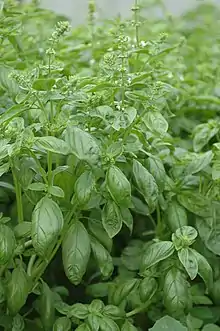basil
English

Pronunciation
- (Received Pronunciation, Canada, General Australian) IPA(key): /ˈbæz.əl/
Audio (UK) (file) - Rhymes: -æzəl
- Homophone: Basil
- (Canada, US) IPA(key): /ˈbeɪ.zəl/
- Rhymes: -eɪzəl
Etymology 1
Inherited from Middle English basile, from Middle French basile, from Old French basile, from Medieval Latin basilicum, from Ancient Greek βασιλικόν (basilikón, “royal”), from βασιλεύς (basileús, “king”). Doublet of basilic, basilicon, and basilicum; further related to basileus, basilean, and basileiolatry.
Noun
basil (usually uncountable, plural basils)
- A plant (Ocimum basilicum).
- Synonyms: sweet basil, St. Joseph's wort, common basil, American dittany, great basil
- The leaves of this plant used as a herb.
- Synonym: sweet basil
- Any other species in the genus Ocimum.
Derived terms
- Asian basil (Ocimum basilicum var. thyrsiflora)
- basil balm (Monarda clinopodia etc.)
- basiled
- basil thyme (Acinos arvensis, syn. Calamintha acinos)
- basilweed
- common basil (Ocimum basilicum)
- field basil (Clinopodium vulgare, Pycnanthemum virginianum, etc.)
- hoary basil (Ocimum tenuiflorum)
- holy basil (Ocimum tenuiflorum)
- Lao basil (Ocimum tenuiflorum)
- lemon basil (Ocimum × africanum)
- purple basil (Ocimum basilicum purpureum)
- sweet basil (Ocimum basilicum)
- Thai basil (Ocimum basilicum var. thyrsiflora)
- wild basil (Clinopodium vulgare, Pycnanthemum virginianum, etc.)
Descendants
- → Indonesian: basil
Translations
|
|
Further reading
 basil on Wikipedia.Wikipedia
basil on Wikipedia.Wikipedia  Ocimum on Wikispecies.Wikispecies
Ocimum on Wikispecies.Wikispecies  Ocimum on Wikimedia Commons.Wikimedia Commons
Ocimum on Wikimedia Commons.Wikimedia Commons
Etymology 2
Variant of bezel.
Noun
basil (plural basils)
- The angle to which a joiner's tool is ground away.
- 1678 April 11 – May 11 (Gregorian calendar), Joseph Moxon, “Numb[er] IV. The Art of Joynery.”, in Mechanick Exercises, or The Doctrine of Handy-Works, […], volume I, London: […] Joseph Moxon, published 1678, →OCLC, § 10 (Of Grinding and Whetting the Iron, and Other Edge-tools), pages 71–72:
- [H]old the edge of your Iron upvvards in your left hand and your VVhet-ſtone in your right, and having firſt ſpit upon your Stone to vvet it, apply it to the Baſil of your Iron, in ſuch a Poſition that it may bear upon the vvhole bredth of the Baſil; and ſo vvorking the Stone over the Baſil, you vvill quickly vvear the courſer grating of the Grind ſtone off the edge on that ſide: […]
Verb
basil (third-person singular simple present basils, present participle basilling, simple past and past participle basilled)
- (transitive) To grind the edge of a tool to an acute angle.
Etymology 3
Corrupted from English basan, from French basane, from Late Latin basanium, from Arabic بِطانَة (biṭāna, “lining”).
Etymology 4
From Old French basile (“basilisk”).
Noun
basil (plural basils)
- (obsolete) A type of cannon.
- (now historical, archaic) A fetter fastened round the ankle of a prisoner.
- 2001, Richard Flanagan, Gould's Book of Fish, Vintage, published 2016, page 49:
- When I once more feel that sharp smarting around the scabby sores that cluster like so many oysters on my ankles beneath my chained iron basils, I know that the tide has turned.
Indonesian
Pronunciation
- IPA(key): [ˈbasɪl]
- Hyphenation: ba‧sil
Etymology 1
From Dutch bacil, from French bacille, from German Bazillus or translingual Bacillus, coined by Christian Gottfried Ehrenberg.
Etymology 2
From English basil, from Old French basile, from Medieval Latin basilicum, from Ancient Greek βασιλικόν (basilikón, “royal”), from βασιλεύς (basileús, “king”).
Derived terms
- daun selasih
Further reading
- “basil” in Kamus Besar Bahasa Indonesia, Jakarta: Agency for Language Development and Cultivation – Ministry of Education, Culture, Research, and Technology of the Republic of Indonesia, 2016.